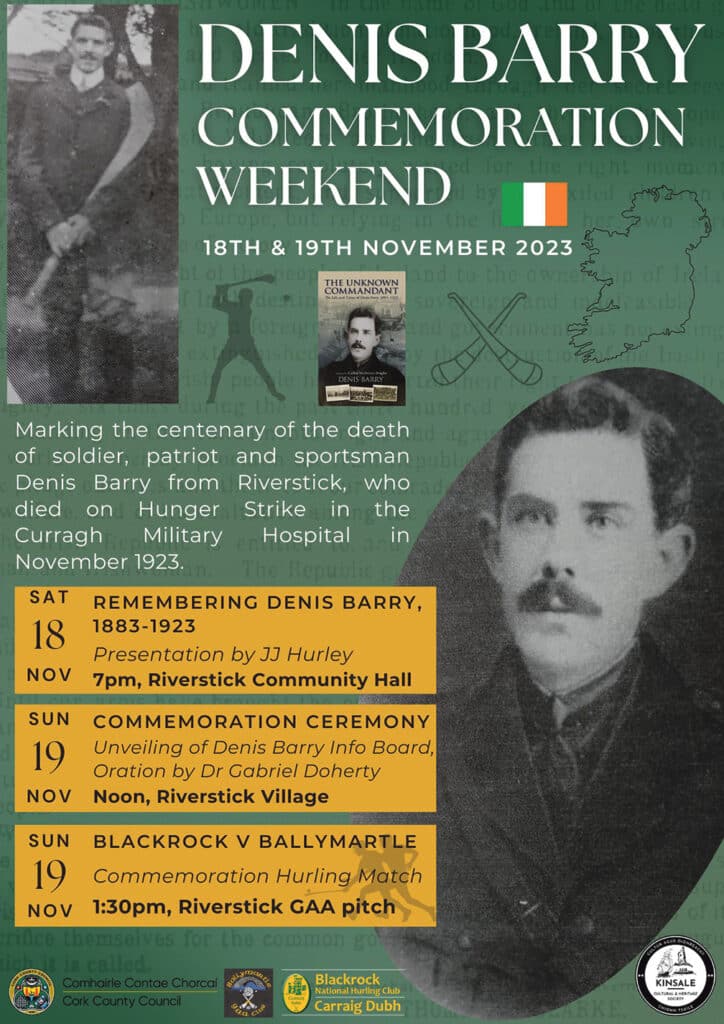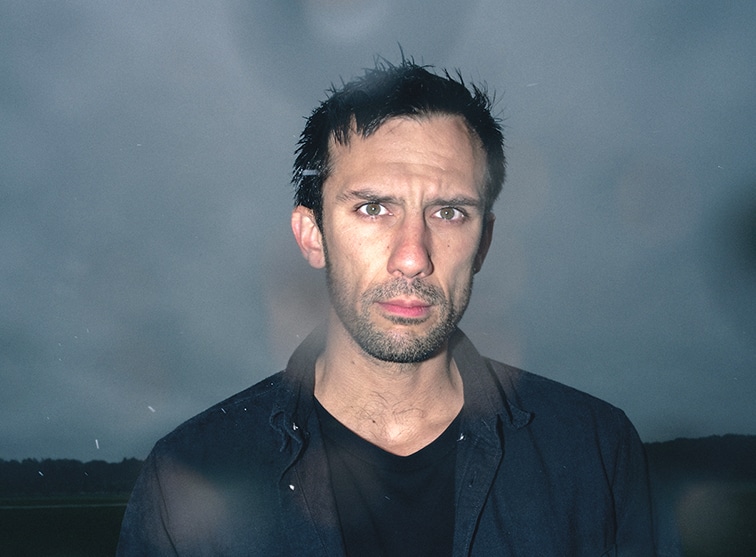Although the Irish Civil War ended in May 1923, Republican prisoners remained in jails across the country. To protest against their interment without trial, many IRA prisoners went on hunger strike in the autumn of 1923. Pauline Murphy has researched one of their number, Staff Officer of the IRA Cork No.1 Brigade Denis ‘Denny’ Barry, also known as Donnacha de Barra, who died on November 20, 1923.
Denis Barry was born into a farming family at Cullen, Riverstick, Co. Cork in 1883. A keen sportsman, young Denis played with Ballymartle GAA club before joining Blackrock National Hurling Club in 1903 when he moved to Cork city to work in the garment trade. He won four county titles in a row with the famed ‘rockies’ of the early 1910s and the Croke Cup with the Cork hurling team. Barry also played Gaelic Football with the Lees club, a city team nicknamed ‘Collars and Cuffs’ due to the large number of drapers and tailors who played for the side!
In Cork city Barry lodged with his sister at 25 Barrack Street whilst working as a draper’s assistant with O’Sullivan & Howard. He was active in the trade union movement from 1907 when he became a union official for the Irish Drapers Assistants Benefit and Protective Association. In 1912 he joined Na Fianna Éireann and the Ancient Order of Hibernians, and was also active in the Gaelic League.
Denis Barry was a founder member of the Cork branch of Sinn Féin and in 1913 he helped to form the Cork branch of the Irish Volunteers, which was later known as the Irish Republican Army. His brothers, Batt and Michael, were also members.
In 1915 Barry relocated to Kilkenny to take up employment with Monster House drapery and continued his Republican activity in the ‘marble city’.
Irish Volunteers in Kilkenny, including Barry, were ready for action on Easter weekend 1916 but their orders were cancelled. In the aftermath of The Rising, the British authorities cracked down on Republican activists and, even though he did not play a part in the Easter week insurrection, Barry was arrested by the RIC at his place of work on May 3 and sent to Frongoch Prison Camp in Wales.
On his release Barry resumed his activities with the Republican movement and in 1917 served as an election agent for Sinn Féin candidate W.T. Cosgrave in the Kilkenny by-election, which Cosgrave won.
Barry returned to Cork in 1918, where he was appointed to the staff of the Cork No.1 Brigade as an intelligence officer and during the War of Independence he served as O/C of the Irish Republican Police in Cork.
In October, 1920, when Sinn Féin Cork City Lord Mayor Terence MacSwiney died on hunger strike in Brixton prison, Barry was included in the IRA party who travelled to England to escort the Lord Mayor’s remains home.
During the ‘Burning of Cork’ in December 1920, Barry and his Republican police force attempted to prevent looting and he was almost killed in the process.
Barry opposed the 1921 Anglo Irish Treaty and fought with the anti-treaty IRA in the ensuing Civil War. He was transferred to Wexford at the outbreak of the war where he was appointed to the divisional staff of the IRA’s 3rd Eastern Brigade.
He was arrested by Free State troops in October 1922 at Courtown Harbour and sent to Newbridge Internment Camp in Kildare where conditions were notoriously dire; rodents infested the camp, prisoners suffered from lice, bedding was inadequate and heating non-existent. In these conditions many prisoners became ill.
IRA prisoners interned across the country announced a mass hunger strike on October 17, which Barry joined in the Newbridge camp.
By November 12, a telegram had reached the Barry family home in Riverstick informing them that Denis’ health had seriously declined. His brother Batt immediately travelled to Kildare where, upon arrival at the Newbridge prison camp, he was shown to a dirty, cold hut where four hunger strikers lay on stretchers; among them was Denis Barry, conscious but very weak and unable to speak.
Batt requested that his brother be moved to a hospital and on November 19 Barry was moved to the Curragh Military Hospital, where he died the following morning, after 34 days of hunger striking. He was 40-years-old.
Denis Barry was buried by the Free State authorities at a site near the glasshouse military prison. His family were denied his remains but were allowed to visit the grave to recite the rosary; the Barry family had to take legal action before they were finally granted his body. Following the exhumation, Denis Barry lay-in-state at Newbridge Town Hall before returning to his native Cork.
As a supporter of the Free State, Bishop of Cork Daniel Cohalan was staunchly opposed to the anti-treaty IRA and had gone so far as to excommunicate members in Cork. He therefore objected to a religious funeral for Denis Barry. As the hunger striker’s body could not enter a church, it instead lay-in-state at Cork Sinn Féin’s headquarters at 54 Grand Parade and from there was taken in a large funeral procession to St Finbarr’s Cemetery.
The cortège took six hours to reach St Finbarr’s Cemetery. Among the many representations were members of the Cork GAA County Board, Ballymartle Hurling Club, Blackrock Hurling Club, Lees Football club, Na Fianna Eireann, Cumann na mBan and an array of trade unions. In place of a priest was Sinn Féin TD David Kent, brother of 1916 martyr Thomas Kent. Annie MacSwiney, sister of Terence, recited the rosary while Maire MacSwiney delivered an oration.
Denis Barry was buried in a prominent position in the cemetery’s Republican plot, next to Terence MacSwiney and Tomas MacCurtain.



